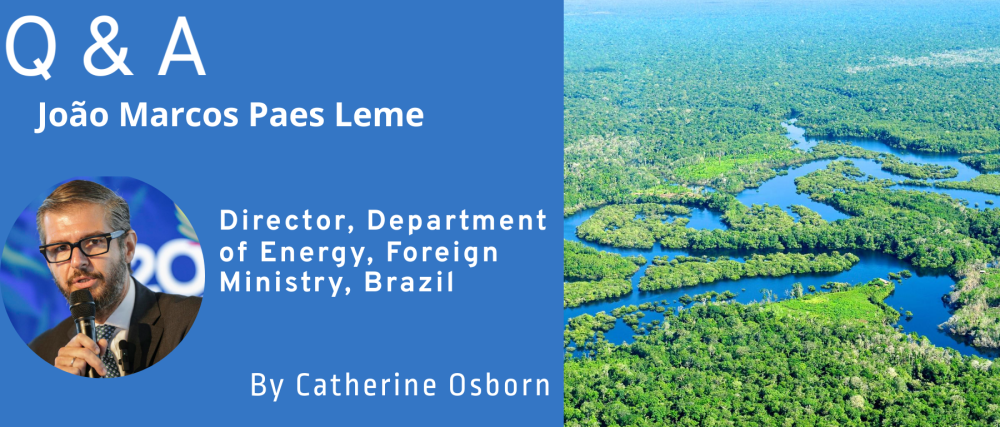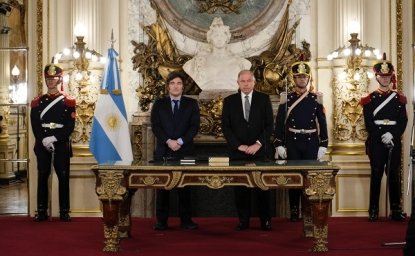
A blog of the Latin America Program

Q. Brazilian President Luiz Inacio Lula da Silva pledged to make his country “the Saudi Arabia of renewable energy.” Under his leadership, Brazil has become active in discussions about biofuels at the G20 and the Global Biofuels Alliance, including for shipping and aviation. How is Brazil working to overcome obstacles to its goals in the area?
A. Sustainable fuels for aviation and maritime transport are crucial indeed, as those are hard-to-abate sectors the world has to decarbonize as fast as we possibly can. And no single country will be able to produce enough clean fuel to replace fossil alternatives at scale. Our main goal is speeding up the development of these fuels in a sustainable way worldwide. This is a priority both of the Global Biofuels Alliance, of which we are a founding member, and of the G20 we currently chair, in particular in the G20 Energy Transitions Working Group.
There are obstacles, such as preconceptions about certain technologies, a resistance that is not always science-based. We champion an “agnostic” approach to the energy transition: if a solution is sustainable and low in emissions–be it electric vehicles, solar energy, nuclear, wind, biofuels, synthetic fuels, biogas–it should be adopted wherever it makes sense. What we need are clear and objective sustainability criteria based on the life cycle of the carbon intensity of each option. This is known as “technological neutrality.” Cherry-picking is not an option in a crisis like the climate emergency we are facing.
Q. Brazil has enormous potential to play a role in the supply chains for other types of green energy, such solar and wind power, as well as electric vehicles. Considering biofuels are a special focus of Brazil’s partnership with the International Energy Agency, are these other sectors also priorities?
A. Of course biofuels have been and will be extremely important. But don’t get us wrong, they are not a national obsession. We are lucky to have a diversified energy mix. If we look at Brazil’s electricity output, it is around 90% clean or renewable. Hydropower has been a major source of clean energy for decades. Recently, solar and wind have grown significantly. They account for 20% of our electricity; a decade ago, they amounted to nearly nothing. Electric vehicles are perhaps not a top priority as they are elsewhere, but this does not mean we do not pay attention to them. Hybrid cars running on ethanol and electric batteries are making a splash in Brazil. Electric buses are becoming more and more common, proving to be a solution in bigger towns and major cities, with a Brazilian company behind their success. As I said earlier, we believe in an “agnostic” approach to decarbonization. There is no one-size-fits-all solution, not even within our own country.
Q. In 2021, Brazil issued a decree laying out its strategic mineral policy. The Ministry of Mines and Energy said recently that the policy needed revision. What changes can we expect, and might any of them be related to environmental protection?
A. It is not the Foreign Ministry’s job to determine domestic policy. But it is our job to lead internationally whenever a policy has a foreign dimension. We work hand in glove with the Ministry of Mines and Energy and other government departments in all areas that have an international dimension. Strategic minerals are key to the energy transition globally and play a central part in increasing electrification and energy storage. This is one policy area in which the domestic and foreign dimensions are particularly intertwined. So this is an area in which the two ministries–Foreign Affairs and Mines and Energy–have been working closely together as a new policy on strategic minerals is being drafted.
Brazil is home to considerable deposits of minerals now considered strategic in the context of the energy transition. As a government, Brazil has two major guidelines: we will not be drawn into international value chains as mere exporters of raw materials, and we will not be drawn into “clubs” whose purpose is to exclude countries based on polarizing geopolitical considerations. We want to be a part of reliable and resilient global supply chains of renewable energy, and strategic minerals are an important part of them. Here, too, we are “agnostic.” Here, too, we think climate change is far too urgent to be an afterthought.
Author

Independent journalist, Writer of Foreign Policy’s Latin America Brief

Latin America Program
The Wilson Center’s prestigious Latin America Program provides non-partisan expertise to a broad community of decision makers in the United States and Latin America on critical policy issues facing the Hemisphere. The Program provides insightful and actionable research for policymakers, private sector leaders, journalists, and public intellectuals in the United States and Latin America. To bridge the gap between scholarship and policy action, it fosters new inquiry, sponsors high-level public and private meetings among multiple stakeholders, and explores policy options to improve outcomes for citizens throughout the Americas. Drawing on the Wilson Center’s strength as the nation’s key non-partisan policy forum, the Program serves as a trusted source of analysis and a vital point of contact between the worlds of scholarship and action. Read more


Brazil Institute
The Brazil Institute—the only country-specific policy institution focused on Brazil in Washington—aims to deepen understanding of Brazil’s complex landscape and strengthen relations between Brazilian and US institutions across all sectors. Read more

Explore More in Weekly Asado
Browse Weekly Asado
¿Qué Vemos Hoy?

Uphill Battle for Argentina’s Feminists

ColombIA

